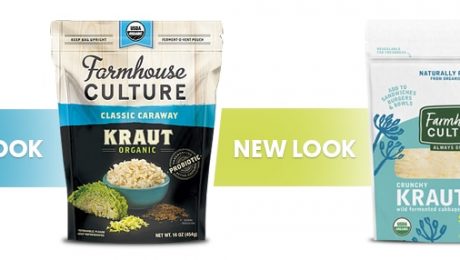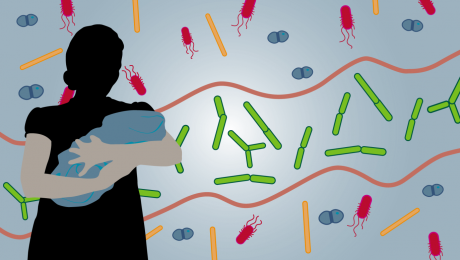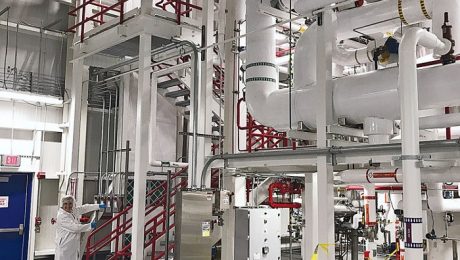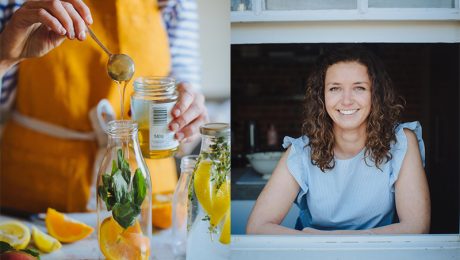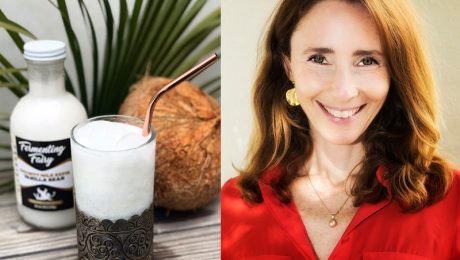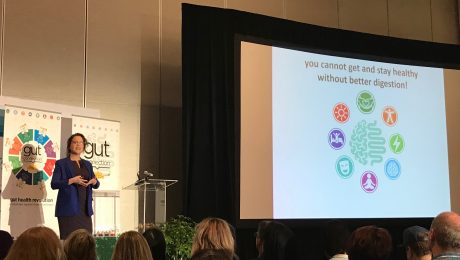Why a Probiotic Pill Doesn’t Help the Microbiome, but Ferments are Key
Summer Bock compares the gut microbiome to a forest. If a fire destroys the forest and forest restoration is attempted by just introducing a few animals, the forest would never rebuild.
“That’s what we’re missing with probiotic pills,” Bock says, adding that relying on a probiotic pill to fix the gut is like telling a few bacteria strains: “’You’re in charge of building our entire gut microbiome,’ you just can’t. if you’re just picking a few probiotics and saying ‘You’re the work horse, you’re going to do all of it,’ they can’t. You have to go think of this bigger picture ecosystem. When we use ferments, we’re bringing in some of the nutrition, the soil and even bringing in a greater variety of probiotics than what you find in most pills. …there’s a huge benefit of ferments that people are missing out on.”
A fermentationist, health coach and founder of Guts and Glory, Bock detailed how fermented foods can improve overall health at the Fairmentation Summit. She coined the word “gut rebuilding” and was the founder of the Fermentationist Certification Program.
Bock started fermenting after becoming incredibly sick. A trained herbalist, Bock began treating multiple food allergies, regular panic attacks and chronic exhaustion with herbs. This was long before terms like probiotics and gut microbiome were a regular part of diet discussions. But Bock was recommended by a naturopathic doctor to try taking probiotics, and “a lot of my symptoms started clearing up very quickly.”
Bock, though, is a purest, and wanted to know how she could ingest probiotics without taking a pill.
“What’s the whole food version of probiotics?” Bock said. “If I’m missing it and I’ve wiped it out with antibiotics, how did my ancestors get this into their body on a daily basis? That’s how I discovered fermented foods.”
So Bock started fermenting everything. During this experimentation process, Bock sold sauerkraut and kimchi from her fridge, launching her first sauerkraut company. She described sharing sauerkraut with her roommate’s friends, skeptics who would initially say “I don’t like it,” but would come back a week later and tell her “I have to come back and but it because I can’t stop thinking about that one bite.”
“This is an addictive healthy food, and I got fascinated by what is happening on your taste buds that makes your body go ‘I don’t like this right now,’ but your body recognizes that health benefit,” Bock said. “If there’s some communication happening through one little bite of food and that person can’t stop thinking about it and they want it, I’m still utterly fascinated by that today.”
Her favorite fermented food is kimchi “because it has all the benefits of lacto-fermented vegetables, it has all the great probiotics in it plus it has prebiotics, it has organic acids and the lactic acid which is a natural microbial.”
Studies during the avian flu outbreak found birds who ate kimchi were not contracting the bird flu. One microbiologist in South Korea found 11 of 13 chickens infected with avian flu who ate kimchi made a full recovery. All birds in the control group died.
“Fermented foods are really powerful, and I think that what’s fascinating about them for me is they differ from just probiotics. They contain probiotics, but they also have the prebiotics. They have the entire ecosystem,” she said. “We eat it because it’s delicious, but we also eat it because that food assists us in some way.”
Probiotic-rich ferments “acts as a fertilizer” for the gut microbiome, killing off pathogenic organisms. Microbes grow best at room temperature, a temperature the health department defines as a danger zone because it’s the best temperature for pathogenic, food-born illness to grow.
“What we’ve found is, when there’s that acidic environment, these pathogenic food-borne illnesses can’t exist there. They don’t grow,” she adds.
Multiple nutrients are produced through fermentation, like Vitamin B and Vitamin K. Only a few organisms produce these vitamins, Bock notes. They are critical vitamins because they’re not absorbed easily through food. Bok calls them the “star players” of the microbiome. People with an imbalanced microbiome are often lacking in vitamins B and K.
If not fermenting their own food at home, consumers need to practice due diligence when purchasing fermented food brands, Bock says. Kombucha, she shares as an example, is a great “gateway ferment” for most people, but how much sugar is in it? Is it fermented naturally or are lab strains of probiotics added?
“You have to ask yourself, what is the major probiotic we’re talking about,” in the food you’re eating, Bock said. “Is it a naturally-occurring probiotic or a…patented, genetically-modified probiotic?”
Americans have a “Supersize” mentality, Bock said. People shouldn’t be consuming bowls of fermented foods every day.
“Remember that fermented foods are generally a condiment, especially the ones with live organisms, like kimchi and sauerkraut, natto,” she said. “So if you treat it as such, you’re maintaining the respect for these organisms and for these foods,” she said. “Your body knows what it needs.”
- Published in Food & Flavor, Science
Break Out the Kimchi: Study Finds Spicy Kimchi Cures Baldness
Spicy kimchi cures baldness and thickens hair, according to a new scientific report published in the World Journal of Men’s Health. Researchers from Dakook University in South Korea studied men in early stages of hair loss who consumed a kimchi probiotic drink twice a day. After a month, hair count increased from 85 per square centimeter to 90; after four months, hair count increased to 92. Results were even faster and prevalent for female patients with hair loss, who went from an average of 85 hairs per square centimeter to 92 after one month. Hair thickness also increased. This is exciting research for people suffering from hair loss; the kimchi and probiotic product is a natural, safer alternative to hair regrowth drugs. Current hair regrowth drugs have adverse side effects, like irregular heartbeat, weight gain and diarrhea.
Read more (World Journal of Men’s Health)
- Published in Science
Farmhouse Culture Retools Packaging, Embrace “Organic” but Move Away “Probiotic”
Farmhouse Culture is retooling their packaging, moving away from what the CEO calls “natural food cliches.” Using consumer research as their guide, the fermentation brand is using “always organic” on their labels, indicating quality to shoppers. Farmhouse Culture is also decreasing their emphasis on probiotics because, though shoppers want products with digestive health benefits, they’re confused over how to achieve digestive health. The Wisconsin-based brand makes sauerkraut, fermented veggie drinks and sauerkraut chips.
Read more (Nosh)
- Published in Business
Gut Health Hot Food Trend, But Consumers Confused Over Science and Additives
As more people battle digestive problems, they’re turning to brands offering gut health solutions. Digestive health is the third most sought after health benefit in the latest International Food Information Council Food & Health Survey, behind weight loss and energy.
Though it’s a hot topic, it’s a space challenged with unsupported health claims and confusing ingredient additives. During a panel hosted by Food Navigator, four industry leaders shared insight into the growing gut health category.
“What we’ve learned is that many of our consumers come into our brand typically with serious, long term digestive health challenges. Bloating, regularity challenges, IBS,” said Mitchell Kruesi, senior brand manager for Goodbelly, which creates probiotic drinks and snacks. “They’ve tried supplements in the past, but weren’t super enthusiastic about them because often times taking a supplement felt medicinal to them. After that, they continue to seek out other probiotic options that are both effective, but also food-based so that it’s easy to fit in their routine.”
Demystifying Probiotics
Plagued with health issues and fed-up with pills, consumers are desiring food brands that aid digestive health. Flavor, though, is key.
“That delicious taste…it sets up an everyday usage routine, which is critical with probiotics,” Kruesi said.
Probiotics is a confusing territory for consumers. Should probiotics be consumed in pills or as a strain added to food? How much should be taken?
Elaine Watson, Food Navigator editor, quoted GT Dave, founder of GT Kombucha: “In my mind, anything raw and fermented deserves to use the term ‘probiotic.” Watson asked the panelists if there’s a perception that all fermented foods contain probiotics because they contain live, active cultures – and should food advertising probiotics be verified by clinically proven studies?
“I think consumers are quite confused still around the whole topic, in all honestly. Live, active cultures are used to make fermented food beverages – but unlink probiotics, they’re typically not studied and shown to provide a health benefit,” said Angela Grist, Activia US marketing director. Really in order to be considered a probiotic, they would need to meet the criteria of survival and research-validated health benefits and also this point around strain specificity.”
Grist said probiotics need to survive the passage through the digestive track to the colon. Activia has five survival studies showing the benefits of probiotics.
Ben Goodwin, co-founder of Olipop, added he’s conducted genetic assays around the underlying culture banks of fermented food and beverages and “there have definitely been organisms in the culture banks which are deleterious for human health. So not everything that’s fermented is automatically good for human health, there’s all sorts of different biological modes that organisms can interact with each other and some become parasitic or become determinantal to your probiotic when consumed, so something to keep in mind.”
Note that the panel did not feature a raw, fermented food brand; the companies included on the panel all add probiotic strains to their food and drink product.
In a separate interview with The Fermentation Association, Maria Marco, professor in the Department of Food Science and Technology at the University of California, Davis, said there is a lot of confusion around probiotics, even among industry representatives. Marco, though, agrees with Grist and Goodwin. She says clinical studies on fermented foods are necessary.
“Although it might be possible to separate out the individual components of foods for known health benefits (e.g. vitamin C), the benefits of many foods are likely the result of multiple components that are not easily separated,” Marco said. “Yogurt consumption is a great example of a fermented food that, through longitudinal studies, was shown to be inversely associated with CVD risk.”
In one of Marco’s studies at UC Davis titled “Health benefits of fermented foods: microbiota and beyond,” Marco and her research associates concluded that fermented foods: are “phylogenetically related to probiotic strains,” “an important dietary source of live microorganisms,” and the microbes in fermented foods “may contribute to human health in a manner similar to probiotics.” The study adds: “Although only a limited number of clinical studies on fermented foods have been performed, there is evidence that these foods provide health benefits well-beyond the starting food materials.”
Educating Consumers
The panel said that the food industry is responsible for displaying integrity in their marketing on probiotic benefits.
“We believe it’s critical for leading brands in the space…to really educate consumers on, first, what probiotics are,” said Kruesi with Goodbelly. Consumers are seeking out probiotics for a specific health benefit, but most don’t know what strain they need to address their issue, he noted.
Probiotics are live microorganisms that aid the digestive system by balancing gut bacteria.
Currently, the demographic of consumers buying products geared toward gut health are millennial females in coastal cities. Both Activia and Olipop sell to more women than men (Activia customers are 60 percent female and 40 percent male; Olipop customers are 55 percent female and 45 percent male).
Goodwin said Olipop is hoping to tap into the rapidly declining soda market. Soda is a $65 billion industry, with 90 percent household penetration. But more consumers are turning to healthier options than unnatural, sugar-filled soda.
“We’ve tried to take on the extra responsibility as a brand of formulating something that’s spun forward, delicious and really approachable so that we can meet a real health need in a way that’s actually supported by research,” Goodwin said. “(Olipop) is not only low sugar, low calorie, it also has this digestive health function but obviously doesn’t taste like vinegar because it’s not a kombucha.”
Solving Digestive Stress
Products by Activia, Goodbelly, Olipop and Uplift Food (the fourth panel member) are “meant to be a mass solution for the lack of fiber prebiotics and nutritional diversity in the modern diet,” Goodwin said. Fiber contains prebiotics, which aid probiotics.
The USDA’s dietary guidelines recommend adult men require 34 grams of fiber, while adult women require 28 grams of fiber (depending on age). The reality, though, is that most Americans get about half the recommended fiber a day, only 15 grams. According to the National Institute of Diabetes and Digestive and Kidney Diseases, 60-70 million Americans are affected by digestive diseases.
Compare that to the diet of hunter-gatherers, who eat about 100-150 grams of fiber each day and maintain incredibly healthy guts or microbiome. The microbiome is the community of commensal microorganisms in our intestines, fed by fiber, probiotics and prebiotics.
“As it stands now, basically we’re putting in a starvation system for a lot of the microorganisms currently in your gut,” Goodwin said. “The average industrialized consumer has about 50 percent less diversity and abundance of beneficial microorganisms than the hunger-gatherers alive on the planet tonight.”
Future of Gut Health Products
Grist with Activia said probiotics need to be consumed in adequate, regular amounts to provide health benefits, or else probiotics will not consume the digestive track.
Kara Landau, dietitian and founder for Uplift Foods which makes prebiotic foods, added that each individual has a unique bacterial make-up, and providing diverse food to support the microbiome is critical.
Landau said the future of gut health probiotics will be selling a specific probiotic strain, one that a consumer can target for their desired health benefit. Prebiotics – “the fuel for the probiotics” – are also key, and a new part of the digestive health puzzle that brands need to communicate and simplify for consumers.
“Prebiotics are still very much in their infancy when it comes to consumer understanding,” Landau said. “Seeing them alongside probiotics enhances the clarity of their benefits.”
- Published in Science
As Modern Gut Microbiomes Suffer, Science Focuses on Personalized Diets
Our gut microbial communities are being killed off by antibiotics, to the extent that “the most affluent children in the world have a variety of autoimmune diseases,” says Bruce German, a professor of food science and technology at the University of California Davis. In today’s advanced age of science, medicine and technology, rates of allergies, asthma and eczema are all increasing.
“By every criteria, humans should be enjoying the best health in human history,” says German, who has spent decades studying the infant gut microbiome. But instead, “most of us are suffering from a variety of chronic and degenerative conditions that are the result of inappropriate diets.”
German – also the director for the Foods for Health Institute and the co-founder of Evolve Biosystems – shared insights on the future of personalized diets at Natural Products Expo West. He said we shouldn’t be asking should diets be personalized, but why hasn’t it been done yet?
Antiobiotics & Unintended Consequences
He points to the unintended use of antibiotics. Though antibiotics have been hugely successful in eradicating nutrient-deficient diseases – like scurvy and goiters – we’ve now become too relent on vitamins.
“From a public health perspective, the strategy that made sure everyone got enough of essential nutrients just overdosed the population. Everyone gets more than they need. It’s been our public health strategy – and it’s worked,” German says. “But the consequences of that decision is that nutrients are more important than foods.”
Though infectious diseases no longer plague the human population, antibiotics have had unintended consequences.
“Antibiotics kill pathogens, but they also kill commensal organisms,” German says. “And our entire microbial community in and outside of us are now seeing the consequences that huge success of antibiotics.”
Adding to that disruption of the human microbial community: food product branding. German says that, by the end of the 19th Century, the No. 1 cause of infectious disease was contaminated food. Food had no value as an enterprise. Branded food products became important, “then we start to get the impression that foods are either food or bad. And, of course, that’s not true. It’s your diet that’s good or bad. An individual packaged food product has very little opportunity to make a significant dent in that. But the consequences of this wonderful economic brand model is we tend to overestimate the power of individual foods.”
Science today must address the consequences of the spectacular success of antibiotics, German says.
Health Answers in Human Milk
To improve human health, the faculty at UC Davis is taking an integrative approach to agriculture. They’re trying to answer the question “What should we eat in the 21st Century?” by bringing together various tool sets across campus, like biology, physics, business, chemistry and law.
“The problem is, for the past 70 years, we have not been investing in health,” German says.
Human milk, German believes, could provide answers to restoring damaged microbiomes. German has spent the past two decades studying lactation and its role in evolution. With the help of Carlito Lebrilla, chemistry professor at UC Davis, scientists found human milk contains a large proportion of oligosaccharides. Babies, though, are unable to digest oligosaccharides. These oligosaccharides, findings showes, exist to nourish bacteria.
That bifoda bacteria fuels the baby, protects the baby from pathogens, educates the immune system and provides nutritional components.
“Mothers are literally recruiting another lifeform to babysit their baby,” German said. “It’s as important to feed the bacteria in the baby as the baby. …
“The future is going to therefore be in microorganisms, using food as a delivery system. So it’s both bacteria for health and bacteria for delight,” German said.
Some of the great food success stories are a “combination of commodities plus organisms” German says, like chocolate, coffee, bread, beer and cheese. All are fermented foods.
Personalized Diets Core of Future Health Industry
A knowledge-based health industry is what personalized diets will look like, German said. He compared it to Google Maps, the massive, public, cloud-based database accessible by databases. Personalized diets could one day look the same, providing information on current health status, comparing it to an end goal and detailing foods that help achieve the end goal. The individual algorithms will highlight preference, highlighting needed nutrients based on an individual’s favorite food.
“In essence, we don’t think you have to personalize food. You have to personalize the diet,” German says.
Probiotics “Not Particularly Effective”
Could probiotics restore human’s microbiomes? German said studies find, though probiotics are safe, they’re not effective. Probiotics don’t colonize the intestines.
“You probably ingest more bacteria from oral cavity from saliva everyday than probiotics,” German says.
- Published in Science
World’s Largest Probiotics Fermenter Opens in New York
- Published in Business
Founder of Fermented By Lab Shares Food Diary Featuring Fermented Products
One question commonly posed by consumers starting to eat fermented products: How do I incorporate fermentation into my daily meals?
Alana Holloway, founder of Fermented By Lab, provides a great overview on how she uses fermented food and drinks. Hollaway’s food diary illustrates that it’s possible to include fermentation as a key element to every meal. Her simple meals are easy, delicious and highlight ways the average consumer can pair fermented food and drink with their regular food. Her dairy is also a great example of creative marketing fermented food brands can use to showcase ways to use their food.
Here’s Alana’s food diary, showcasing what she eats to keep her gut in good health.
Approach to food: I love to eat intuitively, according to the seasons… not only that, but according to the weather and how I’m feeling on any given day. After a lifelong battle with eczema, I have now found the key to managing it with the right foods for my body, and a complimentary lifestyle, too. I like to maintain a balanced, healthy gut and so eat/drink ferments every day… just as well I run a company that makes them!
Food Diary:
DAY 1 – FRIDAY
I tend to start day with about a pint of warm water. I really find it gives me immediate energy following sleep. I’m really not a lover of cold water, so will always drink it at room temperature or warm/hot.
I usually have breakfast about 10.30 as I struggle to eat too early in the morning. I like to allow my body time to build up a good hunger! Now that Spring is here, I’ve swapped my porridge for smoothies. This morning’s is organic cooked beetroot (I cook up a batch and then freeze it for smoothies), organic frozen strawberries from last Summer, a green banana, which is a great source of prebiotic fibre, coconut yoghurt, goats milk Kefir for the all-important probiotics, Plenish cashew milk (my favourite) and a little raw honey for a some more prebiotic love! I also take an omega 3 supplement; generally speaking, I’m not a massive supplement advocate and prefer to get what I need from my diet, but as I am prone to really dry skin, I find this one helps.
I grab a small handful of Brazil nuts as I head out the door.
At 1pm I have a chunk of goats Gouda and another pint on warm water whilst waiting for my lunch to cook. I can tell it’s going to be a hungry day for me today!
At 1.30, I have a lunch of sliced avocado roasted chickpeas with nigella seeds, soft boiled egg, roasted sweet potato, Fennel + Lemon Kraut from the Fermented by LAB Spring Collection, steamed broccoli & kale.
3.30 small glass of Kombucha as I need a bit of a kick!
At 7pm I have dinner – it’s lentil Dahl with Carrot + Coriander Kraut from last year’s Autumn Box (one of my favourite things about fermenting foods is getting to eat them months later!)
I drink a Golden Mylk before bed and soak some oats for tomorrow morning’s porridge… I mentioned Spring too early and hear it’s due to snow tomorrow!
DAY 2 – SATURDAY
10am – I start the day with two huge mugs of warm/hot water again and follow it with the porridge I soaked last night. I always soak my grains/pulses/legumes to make them easier on my digestive system. My porridge toppings are roasted rhubarb, coconut yoghurt, a little raw honey and some chopped Brazil’s.
3pm – Lunch is a chunk of goat’s milk Gouda (I can’t get enough of it!) and roasted broccoli, carrot, fennel, sweet potato and nigella seeds with a soft-boiled egg (again!) Despite it being the weekend, I’m working and need something easy to cook which doesn’t require too much thought!
5pm – I have a bottle of Red Grapefruit + Rosemary Kefir from the Spring Box. I’m lucky enough to be able to delve into a good selection of seasonal ferments… it means I don’t get bored with eating the same Kraut all the time!
7pm – I try to stop eating by 8pm so that I can give my digestive system a break overnight. As I had a late lunch, I’m not overly hungry so make a beetroot, carrot (both cooked and frozen), blackcurrant, green banana and goats kefir smoothie and have a mug of chicken bone broth.
I drink a small Golden Milk just before bed. They really relax me and as I have a history of eczema, find they really help keep my inflammation at bay.
Best piece of advice about health + wellbeing?
Don’t search for all the answers in one place. Every day, I try to remind myself that it’s not just about a healthy diet, a good exercise regimen, good quality sleep or daily meditation practice, for example, it’s a combination of all of them that allows you to live your healthiest and happiest life.
- Published in Food & Flavor, Health
Q&A with Lauren Mones, founder of Fermenting Fairy
Ask Lauren Mones for business advice and the founder of Fermenting Fairy will say “go grassroots.” In less than two years, Mones has grown her home-based business selling bottles of kefir outside a yoga studio to a USDA certified organic brand sold in dozens of Los Angeles health food stores and online.
Success, Mones says, did not come because she implemented scaling tactics or hired a sales manager. Instead, Mones did everything in the beginning – producing, packing, selling, inventory, money management – so she quickly learned how to troubleshoot.
“You as the founder should do everything for the business in the beginning,” She said. “When you start expanding and hiring on people, you know the pitfalls and blackholes. It’s harder. You’re going to put in a lot of work. But the payoff is big.”
In an increasingly corporate world where consumers want to support local brands, staying grassroots has been key to Fermenting Fairy’s success. Forming relationships with customers and retailers has been key for Mones to sell her coconut milk kefir, probiotic lemonade and unpasteurized sauerkraut. She still answers the company email, handles in-store demos and pitches retailers.
“What I see a lot of companies doing is they start hiring out really quickly and then they don’t see where things can go wrong, they don’t know where to create solutions,” she says. “Nowadays, customers want to support the little guys. They want artisans. They want to know who they’re buying from. And my customers know me because I answer their questions, I handle the social media account. And, if you do that, customers will go to bat for you.”
Read below for our Q&A with Mones, whose business tagline is: “A simple solution that works hard for your health.”
Q: You are open about your diagnosis with Crohn’s Disease. Tell me how that first got you interested in fermented foods.
About 5 years ago, I was actually the healthiest I’ve ever been in my life. Then, out of the blue, I was the sickest I had ever been. It was one extreme to the next. I was working full-time as an occupational therapist, racing 3-4 triathlons a year, training 20-30 hours a week plus, I was engaged to a man I loved at the time. Everything was seemingly great.
Then I started showing signs of really bad gut health. I was having bowel movements 20 times a day; I was afraid to leave the house because I never knew when I had to go. Then my bowel movements became super urgent. I was in my mid-30s and pretty much incontinent. I wasn’t absorbing any nutrients, I was losing so much weight, I could barely walk two stairs before felt like my heart was leaping out of my chest.
I finally had a colonoscopy and I was diagnosed with Chron’s. I didn’t even know what that was. The doctors told me food was irrelevant, that it had nothing to do with my disease. They said “Go eat ice cream and bread, gain your weight back.” I knew that wasn’t true. From years and years of taking part in natural, homeopathic medicine, I knew food had a lot to do with how I felt.
I went to Barnes and Noble in the cooking section and came across the book “Paleo approach.” It had a little paragraph that fermented foods might be a good idea for autoimmune diseases. I bought my first jar of good sauerkraut. I had never had good, raw sauerkraut before, just the sauerkraut you’d get at like a New York hot dog stand. I took my first bite, and it was magical. I felt this surge of energy. I felt something shift in me. I knew it was a good sign, so I started adding it 2-3 times a day to my diet. It changed my bowel movements; I was going less and less and finally had formed stools.
That really opened my eyes to fermented foods. I started making my own kefir, making my own kombucha. I was transforming my physical body. I got off all my medications after 4 months. Now fermented foods are my medicine, I don’t go a day without one of them at least.
Q: Why did you turn to live, raw fermented foods instead of a probiotic pill?
I was taking probiotic pills way before they were even a pill, starting about 25 years ago. I was getting colonics and taking probiotics before gut health was even something. I was really into natural forms of healing and optimal health. I was still taking probiotics everyday when I was diagnosed, but it occurred to me that they weren’t helping. If they were, I wouldn’t have had such a serious diagnosis. And Chrons is a serious disease.
I stopped taking the probiotic pills and turned to fermented foods because I realized, in food form, the body absorbs it better. I also really appreciated the diversity I was getting in the food, not in the pill. And it was just better for me. I loved the taste of fermented foods. Adding it to everything I ate was way easier than taking a pill. I was done with putting foreign things in my body.
Q: When did you first start Fermenting Fairy? And how?
I started in September 2017, so it’s been about 2 years. I started in this yoga studio in Santa Monica, Calif., Bhakti Yoga Shala. I had never intended to have a food company; it was never on my radar. I have always been in the health field, I’m a certified yoga teacher, but I’ve never been a foodie. When I started fermenting at home and creating these incredible recipes, I was giving food to friends, including the owner of the yoga studio. He would come back to me and say “I feel so good eating your food, why don’t you start a food company?” and I said “No way, I don’t even know how to do that.”
One day, I took a yoga class with him and I had given him this kefir. This was a big class, and he told me at the beginning in front of the class “You have to sell this, it’s so good.” About 50 people came up to me after class and asked where they could buy my food. And I thought “OK, I’ve got to start this company.”
My friend offered to have me setup a stand outside of these yoga classes. Back then, I was selling pickles and my almond kefir. I had really good responses, so I took a shot at getting into a farmers market. It happened to be one of the best farmers market — the Brentwood Farmers Market. It was serendipitous, it’s hard to get in there. And within a month I had a lot of return customers, I was selling out of products. It happened very quickly, we were doing very well off the start.
In December, I decided to fill out the Erewhon intake form online. I knew nothing about selling products in stores, I just thought “Let me try. I knew it took people 1-2 years to get into Erewhon. And then, a couple hours after I sent in the intake form, the buyer said “Wow, these look amazing — can you bring in a sample?” By February, we were in three Erehwhon stores. It was in record breaking time to get in the stores.
Eventually we pulled out of all the farmers markets and focused on wholesale. In September 2018, we started online sales so people could order from our website. And in June 2019, we received our USDA Organic certification
Q: Why do you think your products were so popular, so fast?
Because there was a major hole in the beverage sector that we fulfilled. And I honestly didn’t know that at the time. I was creating these products and these recipes for myself; it was a personal thing to heal my body. I love kefir and was playing around with non-dairy forms. I didn’t realize at the time that there was no vegan milk kefir on the market. Now the dairy industry is collapsing, more people want vegan alternatives. The other thing is our lemonade, it’s a probiotic health drink. It’s something that spans all generations that people love. We made it in a very healthy, healing way with no added sugar. I think that’s why Fermenting Fairy really took off — we fulfilled these holes that were left in the beverage industry.
Q: I love the name and logo. Tell me where the idea came from?
When I was really sick and started fermenting, I realized there was an unseen world that is working really hard in my benefit: the microorganisms, the probiotics. To me, it completely changed my life in a spiritual way. When I was really sick and in pain and constantly going to the bathroom and hating my life, those microorganisms gave me hope. It gave me hope that this reality right in front of me wasn’t it for me. There were these beings working on my behalf that brought safety and goodness to my life — like fairies. Fairies are mystical beings that bring joy and goodness to people’s lives, and I really feel that’s the energy we put into my products.
Q: Tell me about your future, where do you see Fermenting Fairy expanding?
Right now, we’re really local. We’re Los Angeles-based. we want to expand nationally and then internationally. Health stores, and then conventional stores. I would love for the entire world to get a hold of my products.
But my true, honest hope and for me the ultimate goal is to penetrate Western medicine. To get the Western doctors on board, to see my drinks on the food tray of patients at a hospital, that’s when I will really feel like I’ve done my part in shifting the world. I also see my products getting into clinical trials for cancer, autoimmune disease, researching how our products can help healing and preventing those diseases. I see a lot of research into mental health possibilities.
Q: Using fermented foods as a healing tool is very common in other countries. Why do you think the U.S. is behind in that science?
Our FDA considers fermented foods risky. Even when California passed the Cottage Food Law, which allows you to start a food company at home, the law still won’t allow you to start a fermented food company at home because they consider fermented foods a dangerous food. Things are not going to shift quickly until we realize eating fermented foods is safer than eating a salad. The U.S. is a ways behind in realizing how safe and healing fermented foods are. Europe is way ahead of us on that.
Q: What myths do you think the public believes about fermented foods?
One, that they’re dangerous. Eating raw vegetables are more dangerous than fermented foods. When done right, fermented foods actually prevent any kind of Listeria or E.coli infection.
Another myth people tell me is “I tried kombucha and didn’t like it, so I don’t like fermented foods.” To people that say that, I ask well do you like yogurt? The biome of the ocean is the same as the biome of the forest. It couldn’t be more different. If one fermented food didn’t work for you, then try some others because they’re all different.
Q: How can we as an industry do a better job educating the public about fermented foods?
Before fermented foods really exploded — because we’re right on that cusp of explosion — there needs to be a ton of education. I think having more organizations like The Fermentation Association is really amazing. You bring light to things that are happening, highlighting great companies where great things are happening.
I don’t see a lot of fermented food companies doing a lot of social media education. I’d like to see more of that, I’m diving into it myself, doing educational videos on Instagram. I’m all about education on social media.
I think it’s important for all these companies creating these ferments to try and talk to the people that are so closed off to it. I’m friends with a lot of doctors because of my job history. They have so much power and influence, but they are the most closed off people to fermented foods that I know. Penetrating that medical community will be huge for us. That education piece will unleash a whole new set of people that we can really help.
Q: Do you think consumer awareness of fermented foods is increasing?
Oh yeah, for sure. It’s definitely on the increase. I think, as gut health becomes more relevant to all health, I think fermented foods will just ride that opening. I think consumers are definitely getting more savvy in that awareness of fermented foods. But there’s still a lot of fear around it. All the time still, when I’m doing in store demos, and I say “Do you want to try a sip of kefir?” still there are people who respond “Oh my god, no.” I get that reaction all the time still and it’s so heartbreaking. Awareness is increasing, but fear is still a major factor.
Q: From your Cardamom Rose Coconut Milk Kefir to Apple Cinnamon Sauerkraut, tell me about your unique flavors. Where do you draw flavor inspiration?
Nowhere special. I love plants, I love flowers, I love herbs, I love studying the synergistic qualities of them. I know about the healing properties of plants. I’ve picked plants and herbs that not only have major healing qualities but they work well together. I don’t really get my inspiration from anyone else. It comes to me and I study what works.
I can’t think too much out of the box because it doesn’t work for people. If it’s too strange for people, it won’t sell. We had a cacao basil kefir and it was delicious, but it didn’t sell. It was an odd combination for people. They have to work together synergistically for people, and spin it so it’s right outside the box but not too far out. On July 4th, we’re launching our newest flavor kefir, a turmeric chai spice.
Q: Where do you see the future of the fermented food industry going?
I think it’s only going to go up from here. I see it really booming in a big way. I see a lot of activity happening in the future with new companies coming up on the horizon. I also am excited for the gut-brain connection, how ferments can really affect mental health disorders, like depression and bipolar and anxiety. I think that’s a field that were not even breaking into at all and it’s coming.
I think we’re pretty far from this but I think fermented foods can be incredibly potent in preventative medicine as well, like preventing certain diseases that are on the rise, like diabetes and cancer. I don’t want to make health claims, but i think that’s where we’re going with the industry.
Q: What challenges do fermented food producers face?
The No. 1 challenge is global warming. It’s harder and harder for farmers to produce the quality and quantity that we as small fermented food companies need because of the extreme weather patterns. So one day in California that’s 115 -120 degrees can completely fry all the fruit trees. Then what happens to us is we try to get this organic produce and either the prices are extremely high because of that heat or there’s no good quality produce anymore. I think it’s only going to get worse if we don’t do something about it. I see that as the No. 1 challenge for small — and even the big ones — fermented food companies in general. We have to be a part of that solution, we can’t let that go.
I am adamant about getting certified organic. And if you’re not getting organic, at least using it. A lot of fermented food companies are getting the cheap ingredients and they’re adding to the problem of global warming and poor soil health. I highly disagree with it. It’s only going to make it worse for them in the future. We’re part of the solution, if you’re not doing it for the life of your company, at least do it for the life of yourself and your customers.
Q: What unique strengths do fermented producers bring to the food industry?
I think most of us are probably nature-loving people. I think we see a connection between nature and human health, so we can be really passionate about that and passionate about elevating the quality of food that’s out there. Because now it’s poor quality food that’s out there, but artisanal, handcrafted fermented food companies can change that. Here’s really high-quality, fermented foods. The more people that catch on to that, the more people that will move away from the cheap food and to more boutique food that provide health benefits.
The strengths are loving and respecting nature, respecting the tie between human health and nature and also being super passionate about creating more quality in the food world.
- Published in Food & Flavor, Health
As Consumer Distrust in Probiotic Pills Grows, Fermentation Brands Need to Educate on Benefits of Live Bacteria
Probiotic supplements have been the hype of the health industry for the past few years, but the rage is dissipating. Consumers are starting to distrust probiotic pills, realizing a pill alone doesn’t deliver on promised health benefits.
“The thing is, you can’t just pop in a probiotic and get better health,” said Ashley Koff, a registered dietician and CEO of the Better Nutrition Program. “Consumers are waking up to the fact that our digestive health is more complicated than this. We need to start looking beyond probiotics.”
Good gut health requires more than just a single daily probiotic pill. Fermentation brands need to consider all the nutrients needed for a healthy gut as products are evaluated, marketed and advertised.
“You’re actually not what you eat. You are what you digest and absorb…The demands of our digestive health go so far beyond the probiotics,” said Koff, who spoke at Expo West on “Gut Health Revolution: A Radical New Approach Beyond Probiotics.” “When we walk about gut health, we often think about our stomach or our colon. But what were really talking about here are a bunch of different organs. We have to nourish multiple organs with complementary nutrient demands.”
The digestive system is the core to the entire body system. Koff said: “We cannot get and stay healthy without better digestion.” Most digestive health products isolate nutrients specific to one organ, she added. So while a probiotic may help the small intestine, for example, what feeds the probiotic? What makes the probiotic thrive?
Koff said most probiotic supplements and probiotic-infused products ignore other nutrients. What about magnesium, that helps relax the digestive tract? Probiotic supplements have been marketed as a one-time solution when other critical minerals, antioxidants, amino acids, fatty acids and alkaline are just as critical for gut health.
“We want to make sure we’re getting those nutrients that nourish the microbiome,” Koff said. Live, active bacteria will nourish the good bacteria in the gut, building the immune system. “If we’re getting probiotics, we need to get in prebiotics as well.”
Probiotics made $2 billion in sales in 2018, but their sales are slowing. Prebiotics, however, are doubling sales growth.
Simply put, prebiotics are the foods microbes in the gut like to eat. Mayco Clinic describes prebiotics as “specialized plant fibers (that) act like fertilizers that stimulate the growth of healthy bacteria in the gut.” Probiotics, on the other hand, are living organisms in specific straings of bacteria. Fermented foods are full of live, active cultures, like yogurt, sauerkraut, kimchi and kombucha.
Koff said people shouldn’t be getting all their prebiotics from a supplement. Most prebiotics should come from food.
“It should be deliciously easy for us to get the nutrients that help our gut,” Koff said. “No supplement in the world can override a poor-quality diet. …That’s why it’s so important when you look at a prebiotic that you’re looking at something that’s a whole food, (especially) if a whole food gets fermented.”
Relying on food for all nutrients, though, is hard for the majority of people, Koff revealed. If your probiotic choice is granola, for example, are you going to continue eating that same granola and that same service every day to consistently meet your probiotic needs? And a very small number of people actually eat gut-boosting foods daily. “I find that’s a limiting factor,” Koff said.
Koff specifically touted Country Life’s new line of digestive aids, called Gut Connection. The prebiotics contain EpiCor, a whole food prebiotic. The Gut Connection line contains eight products consumers can take for their needs, like balancing digestive, mood, sleep, stress or weight. Country Life sponsored Koff’s education session.
Athletes: Fermented Food & Drink Best for Performance Enhancement
Put down the Gatorade, athletes — the best performance-enhancing substance is fermented food and drinks. An article in sports magazine STACK says athletes are overlooking fermented products for workout nutrition. Fermented products — like raw sauerkraut, kimchi, yogurt and kefir — heal the body with beneficial bacteria and combat gut imbalances. “The better our digestion, the better we utilize the food we are putting into our body, leading to even better improvements in our strength and health,” the article states. Though there is little research in the field, the article points to one study which found probiotics helped female college athletes improve body composition and deadlift performance.
Read more (STACK)
- Published in Science



